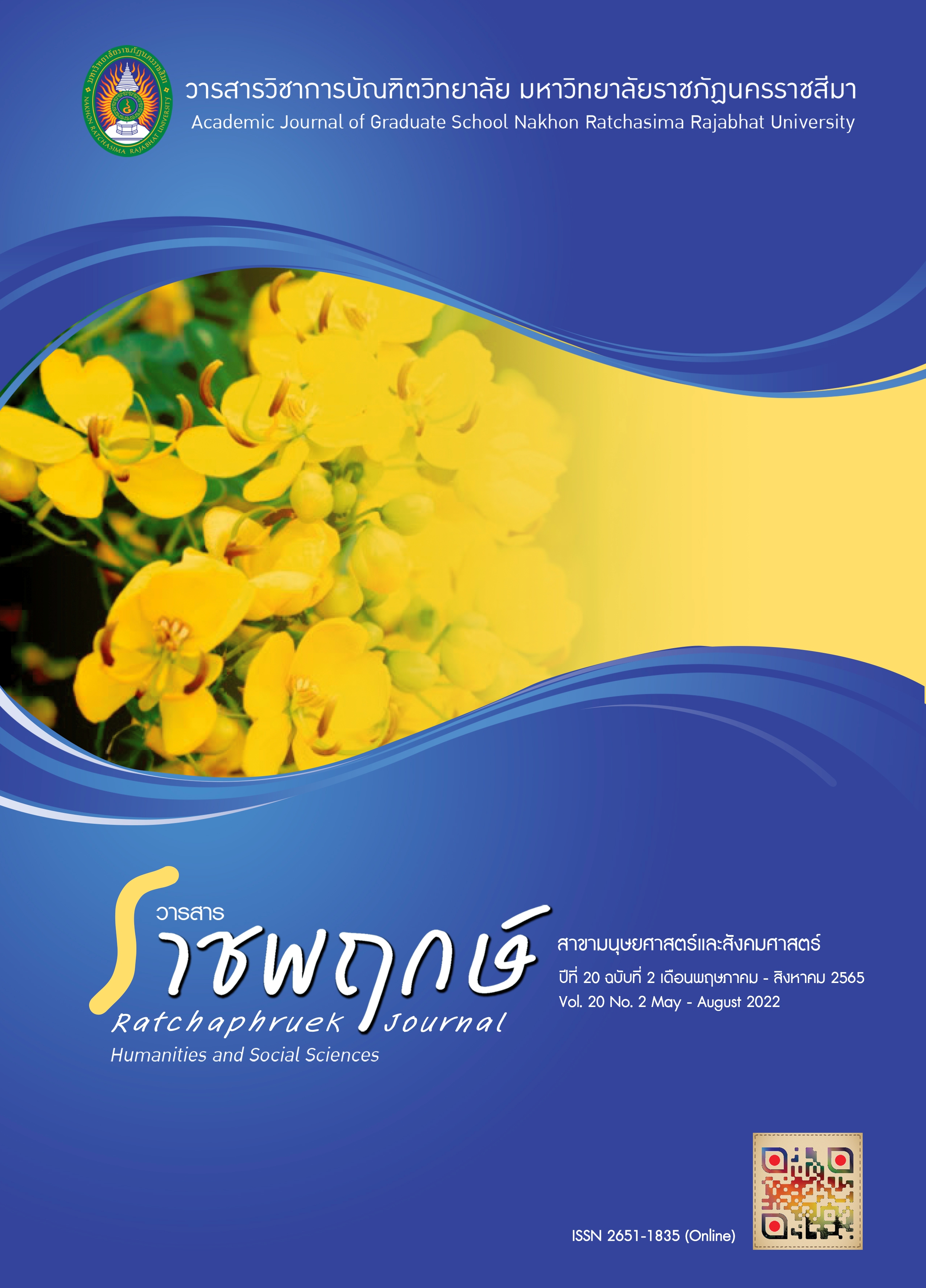Effects of Music Activities Based on Orff and Dalcroze’s Approach on Multiple Intelligences of Early Childhoods
Main Article Content
Abstract
The purposes of this experimental research were to compare 1) musical intelligence ability of early childhoods before and after using music activities based on Orff and Dalcroze’s approach, and 2) bodily- kinesthetic intelligence of early childhoods using music activities based on Orff and Dalcroze’s approach. The sample group used in this study included 26 early childhoods of Assumption College Nakhon Ratchasima situated in Muang District, Nakhon Ratchasima Province, in second semester of academic year 2020. The group of early childhoods in 3/1 class was randomized by cluster random sampling. The research tools were 1) 10 lesson plans using music activities based on Orff and Dalcroze’s approach 2) a musical intelligence ability test, and 3) a bodily-kinesthetic intelligence ability test. Statistical techniques used for data analysis in this study were mean, percentage, standard deviation and the t-test.
The study revealed that
1. Musical intelligence ability of early childhoods using music activities based on Orff and Dalcroze’s approach, after the experiment, was significantly higher than that before the experiment at the .05 level.
2. Bodily-kinesthetic intelligence ability of early childhoods using music activities based on Orff and Dalcroze’s approach, after the experiment, was significantly higher than that before the experiment at .05 level.
Article Details

This work is licensed under a Creative Commons Attribution-NonCommercial-NoDerivatives 4.0 International License.
References
กระทรวงศึกษาธิการ. (2560). หลักสูตรปฐมวัย พุทธศักราช 2560. กรุงเทพฯ: ชุมนุมสหกรณ์การเกษตรแห่งประเทศไทย.
กิติพงษ์ ลือนาม. (2561). วิธีวิทยาการวิจัยทางการศึกษา. นครราชสีมา: โคราช มาร์เก็ตติ้งแอนด์โปรดักชั่น.
กุลยา ตันติผลาชีวะ. (2551). รูปแบบการเรียนการสอนปฐมวัยศึกษา. กรุงเทพฯ: มิตรสัมพันธ์กราฟฟิค.
เชษฐพงศ์ รอตฤดี, พิมลมาศ พร้อมสุขกุล, มนสิการ เหล่าวานิช และประวีนา เอี่ยมยี่สุ่น. (2563). ชุดกิจกรรมการเรียนรู้เพื่อพัฒนาทักษะทางด้านตรีตามแนวการสอนของออร์ฟและดาลโครซ สำหรับนักเรียนชั้นประถมศึกษาปีที่ 1 โรงเรียนรุ่งอรุณ. วารสารครุศาสตร์ปริทรรศน์ มหาวิทยาลัยมหาจุฬาลงกรณราชวิทยาลัย, 7(1), น. 133-144.
ณรุทธ์ สุทธจิตต์. (2544). จิตวิทยาการสอนดนตรี. กรุงเทพฯ: จุฬาลงกรณ์มหาวิทยาลัย.
ณรุทธ์ สุทธจิตต์. (2555). ดนตรีศึกษา:หลักการและสาระสำคัญ (พิมพ์ครั้งที่ 9). กรุงเทพฯ: จุฬาลงกรณ์มหาวิทยาลัย.
ณรุทธ์ สุทธจิตต์. (2561). ดนตรีศึกษา:หลักการและสาระสำคัญ (พิมพ์ครั้งที่ 10). กรุงเทพฯ:จุฬาลงกรณ์มหาวิทยาลัย.
ทิศนา แขมมณี. (2562). ศาสตร์การสอน (พิมพ์ครั้งที่ 23). กรุงเทพฯ: จุฬาลงกรณ์มหาวิทยาลัย.
ธวัชชัย นาควงษ์. (2542). การสอนดนตรีสำหรับเด็กตามแนวของคาร์ล ออร์ฟ(Orff-Schulwerk). กรุงเทพฯ: มหาวิทยาลัยเกษตรศาสตร์.
ประพันธ์ศักดิ์ พุ่มอินทร์. (2559). ประโยชน์ของดนตรีต่อเด็ก (The Benefits of Music for Children). วารสารศิลปศาสตร์ มหาวิทยาลัยศรีนครินทร์วิโรฒ, 20(2), น. 13-24.
โรงเรียนอัสสัมชัญนครราชสีมา. (2562). หลักสูตรปฐมวัยโรงเรียนอัสสัมชัญนครราชสีมา พุทธศักราช 2562 ตามหลักสูตรปฐมวัยศึกษา พุทธศักราช 2560.นครราชสีมา: ผู้แต่ง.
วีรพล แสงปัญญา. (2562). จิตวิทยาการเรียนการสอน (พิมพ์ครั้งที่ 2). กรุงเทพฯ: จุฬาลงกรณ์มหาวิทยาลัย.
อารี สัณหฉวี. (2552). พหุปัญญาประยุกต์. กรุงเทพฯ: อุบล หล่อพัฒนาชัย.
Dalcroze, E. J. (1980). Rhythm, music & education. Hazell: Watson & Viney.
Giddens, M. J. (1993). A unity of vision: The ideas of Dalcroze, Kodaly and Orff and their historical development (Doctoral dissertation, University of Melbourne).
Michelaki, E. &Bournelli, P. (2016).The Development of Bodily-Kinesthetic Intelligence through Creative Dance for Preschool Students. Journal of Educational and Social Research, 6(3), pp. 23-32.
Mills, S. W. (2000). The Role of Musical Intelligence in a Multiple Intelligences Focused Elementary School (Doctoral dissertation, University of Central Florida).
Zachopoulou, E., Derri, V., Chatzopoulos, D. &Ellinoudis, T. (2003). Application of Orff and Dalcroze activities in preschool children: Do they affect the level of rhythmic ability?. The Physical Educator, 60(2). pp. 50-56.


